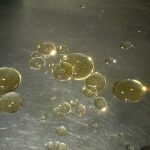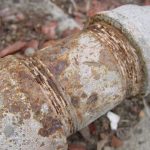Let’s face it, the kitchen sink is probably the hardest working drain in the entire home. But, when the drain starts to slow or stop draining completely, it’s a real problem. Many people have their kitchen sink as a trash can and over time food debris, soap scum and other items can cause clogs. In this article, we will take a closer look at four common sink clogging problems in more detail. They are:
1. Grease and Oils
After you’ve cooked a meal, there may be kitchen grease and cooking oils to dispose of. This oily film or liquid can be found on the coatings of trays, pans, and post when meat has been cooked. Other possible sources include surfaces that have been used to cook with butter or where vegetable oils have been used. Washing dishes coated in grease and oil will melt these materials but they tend to solidify in the drain. The thicker the grease, the greater chance of clog formation, and this material is sticky. Many other materials will adhere to the surface of sticky grease to make the clog even more formidable. Some people even pour used cooking oil into their drain which exacerbates the problem. Wherever possible, avoid placing cooking grease and oils into the drain.
2. Expanding Foods
Certain foods, such as pasta, beans, lentils, rice, and others will expand after soaking or cooking in water. In fact, these foods can expand to many times their original size and this is a huge problem for your kitchen sink drain. Some people scrape their plates clean in the kitchen sink and wash them before they retire. Overnight, these foods will expand in the drain and the kitchen sink is clogged by morning. The best way to avoid this problem is to place fibrous and expandable foods in the trash where they belong.
3. Corroded Pipes
If you have an older home with metal plumbing pipes, you may be experiencing corrosion issues that are causing clogging problems. When metal pipes rust the inner surfaces become rough and pitted which gives waste a surface it can adhere to easily. The sticky waste attracts more waste and over time the inner diameter of the pipe narrows. The other characteristic of rust is that it makes the pipes thicker because rust is less dense than iron. If you’re concerned about older metal plumbing pipes in your home, contact your local professional plumber.
4. Heavier Waste
There are certain heavier waste items that should never enter your kitchen sink drain, such as eggshells, bones, coffee grounds, sand, and more. These items are not easily flushed away in the drain and they can even mix with stick grease to form more formidable clogs.
In Conclusion
Prevention is better than the cure, installing a kitchen sink drain cover and making everyone aware of the problems is a great start. It’s a great idea to schedule some regular maintenance for your plumbing system to ensure that it’s working properly. Contact your local professional plumber if you have a kitchen sink drain clog that you cannot remove. There may be an underlying problem that must be resolved to get the kitchen sink draining again.





